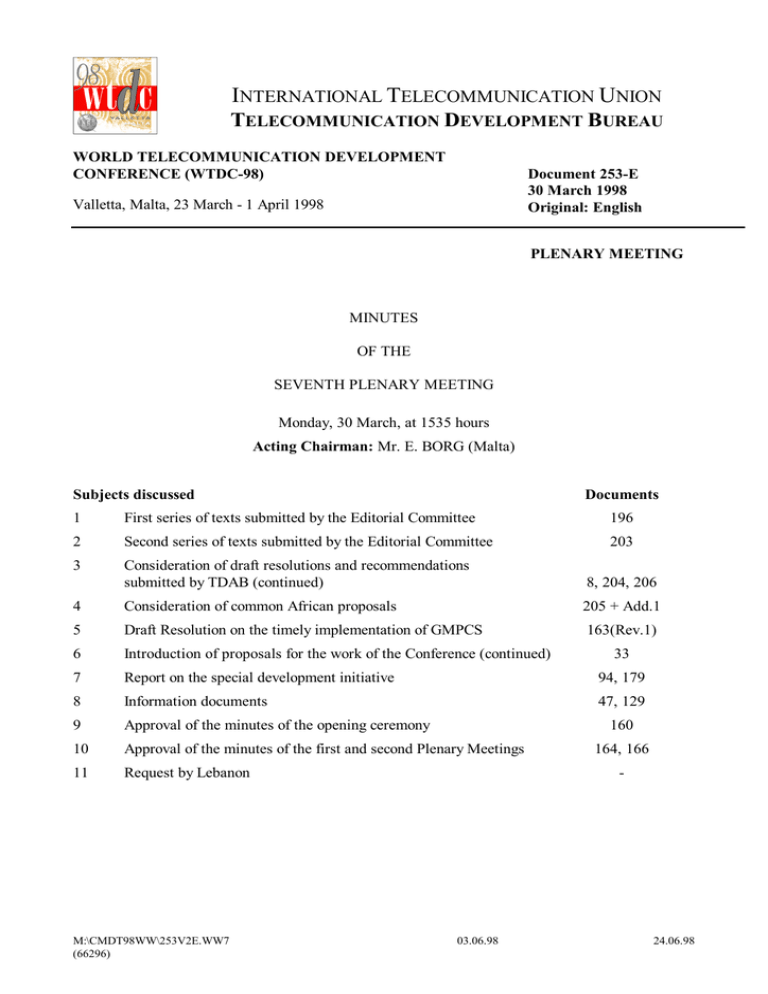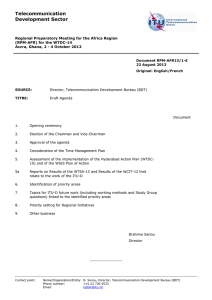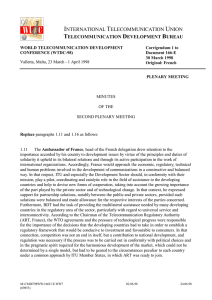I T U D
advertisement

I NTERNATIONAL TELECOMMUNICATION UNION TELECOMMUNICATION DEVELOPMENT BUREAU WORLD TELECOMMUNICATION DEVELOPMENT CONFERENCE (WTDC-98) Document 253-E 30 March 1998 Original: English Valletta, Malta, 23 March - 1 April 1998 PLENARY MEETING MINUTES OF THE SEVENTH PLENARY MEETING Monday, 30 March, at 1535 hours Acting Chairman: Mr. E. BORG (Malta) Subjects discussed Documents 1 First series of texts submitted by the Editorial Committee 196 2 Second series of texts submitted by the Editorial Committee 203 3 Consideration of draft resolutions and recommendations submitted by TDAB (continued) 8, 204, 206 4 Consideration of common African proposals 205 + Add.1 5 Draft Resolution on the timely implementation of GMPCS 163(Rev.1) 6 Introduction of proposals for the work of the Conference (continued) 7 Report on the special development initiative 94, 179 8 Information documents 47, 129 9 Approval of the minutes of the opening ceremony 10 Approval of the minutes of the first and second Plenary Meetings 11 Request by Lebanon M:\CMDT98WW\253V2E.WW7 (66296) 33 160 164, 166 - 03.06.98 24.06.98 -2CMDT98/253-E 1 First series of texts submitted by the Editorial Committee (Document 196) 1.1 Draft Recommendation COMA-A on telecommunication policies and draft Recommendation COMA-B on the impact of the introduction and utilization of new technologies on the commercial and regulatory environment of telecommunications, which had been approved by Committee A, were approved. 1.2 The first series of texts submitted by the Editorial Committee was approved. 2 Second series of texts submitted by the Editorial Committee (Document 203) 2.1 Draft Resolution PLEN-1 (Coordination and collaboration with regional organizations), which had been discussed at the previous Plenary Meeting, was approved. 2.2 Draft Recommendation COMA-C (Tariff policies and methods of determining costs), draft Recommendation COMA-D (Policies and ways for financing telecommunication infrastructures in developing countries) and draft Recommendation COMA-E (Industrialization and transfer of technology), which had been approved by Committee A, were approved. 2.3 The second series of texts submitted by the Editorial Committee was approved. 3 Consideration of draft resolutions and recommendations submitted by TDAB (continued) (Documents 8, 204 and 206) Draft Resolution TDAB-4 on procedures to be applied by study groups (Document 204) 3.1 The Acting Chairman recalled that the text of draft Resolution TDAB-4 had been improved editorially by a drafting group mandated by the Conference to take into account comments made during the sixth Plenary Meeting and the proposals in Document 65 submitted by Tadiran. 3.2 The representative of Tadiran, thanking all those who had participated in the discussion of Document 65, expressed full satisfaction with the text of the draft Resolution as contained in Document 204. 3.3 Draft Resolution TDAB-4 was approved. Draft Resolution TDAB-3 on the establishment of study groups (Document 206) 3.4 The Acting Chairman said that the text of draft Resolution TDAB-3 in Document 206 was based on discussion of the draft Resolution at the sixth Plenary Meeting, during which it had been decided to establish two study groups in ITU-D. 3.5 Draft Resolution TDAB-3 was approved. Draft Recommendation 1 on the role of world telecommunication development conferences (Annex 3 to Document 8) 3.6 Approved. M:\CMDT98WW\253V2E.WW7 (66296) 03.06.98 24.06.98 -3CMDT98/253-E 4 Consideration of common African proposals (Documents 205 and Addendum 1) 4.1 The representative of Mali, speaking on behalf of the co-sponsors, introduced the common African proposals contained in Document 205, which stressed in particular: the importance of BDT; the need to ensure implementation of the decisions taken by the regional telecommunication development conferences, in particular the African Regional Telecommunication Conference (AF-RTDC-96); the results of the second World Telecommunication Policy Forum; the need for greater involvement of BDT in various information programmes carried out by other United Nations specialized agencies within the context of the GII; and, in connection with the recommendations of ITU-2000, support for ITU's leadership role in all telecommunication issues, particularly those relating to the developing countries. Addendum 1 to Document 205 contained two draft resolutions: draft Resolution [CTI/GUI/KEN/MLI/MTN/NGR/SEN/AFS/ZMB/ZWE-1] on the establishment of a coordination committee to monitor, evaluate and review progress on the implementation of resolutions and recommendations adopted at development conferences; and draft Resolution [CTI/GUI/KEN/MLI/MTN/NGR/SEN/AFS/ZMB/ZWE-2] on the implementation of the resolutions and recommendations of AF-RTDC-96. 4.2 Document 205 was noted. 4.3 The representative of Russia said that, while he had no difficulty in accepting the second draft Resolution in Addendum 1 to Document 205, the wording of the first seemed to suggest that the proposed coordination committee would be established on a global rather than regional basis. Its links with other ITU bodies such as TDAB were also unclear. The representative of Italy shared that view. 4.4 The representative of Mali said that the proposal to establish a coordination committee had been made because AF-RTDC-96 had adopted resolutions and recommendations without specifying how they should be implemented. The committee would in no way overlap with TDAB. 4.5 The representative of Saudi Arabia, supporting all the African proposals, considered that it was within the mandate of WTDC-98 to endorse proposals and decisions already taken by the regional conferences. 4.6 The Acting Chairman suggested that the first draft Resolution should be amended editorially to indicate clearly that the proposed coordination committee would be established on a regional rather than global basis. 4.7 It was so agreed. 4.8 Draft Resolution [CTI/GUI/KEN/MLI/MTN/NGR/SEN/AFS/ZMB/ZWE-1], as amended, and draft Resolution [CTI/GUI/KEN/MLI/MTN/NGR/SEN/AFS/ZMB/ZWE-2] were approved. 5 Draft Resolution on the timely implementation of GMPCS (Document 163(Rev.1)) 5.1 The representative of Syria, introducing Document 163(Rev.1), said that draft Resolution [ARS/ARG/BRB/CPV/CTU/USA/J/JOR/PHI/LCA/VCT/SNG/ AFS/TZA/TRD-1] was intended to move towards some degree of standardization in the arrangements for introducing GMPCS services and to avoid differences in interpretation between one administration or one operator and another. 5.2 The representative of the United Kingdom, supported by the representatives of Mexico, Nigeria and Liberia, welcomed the draft Resolution, but suggested that the text of resolves might be reworded to introduce greater flexibility, as it might not be necessary for all countries to M:\CMDT98WW\253V2E.WW7 (66296) 03.06.98 24.06.98 -4CMDT98/253-E introduce licensing machinery for the GMPCS services, and in some countries national legislation to implement the arrangements might be needed. The representative of Mali agreed, and suggested that the text might be presented in the form of a draft recommendation rather than resolution. The representative of Russia, supported by the representative of Niger, endorsed the suggestion by Mali, and proposed an amended text of resolves to read as follows: "to recommend that administrations should embark on an urgent initiative for timely introduction of the GMPCS services in their countries, as flexible and as general as possible". That proposal was supported by the representative of Ghana. 5.3 The Acting Chairman suggested that a drafting group, open to all delegations wishing to participate, should be set up to redraft the text in the light of the above comments. 5.4 It was so agreed. 6 Introduction of proposals for the work of the Conference (continued) (Document 33) 6.1 The representative of Syria, introducing Document 33 and expressing regret that it had not been discussed earlier in the Conference, said that the document was divided into four parts. Part I on alternative calling procedures and apportionment between administrations contained proposal SYR/33/1 which, inter alia, requested administrations and international companies that permitted the use of alternative calling procedures in their countries to respect the decisions of other administrations and international companies whose legislation did not permit such services. Part II concerning the General Agreement on Trade in Services (GATS) and its impact on telecommunications included proposal SYR/33/2 encouraging strategic alliances and investments between developing countries in the field of telecommunications. Part III concerning regional conferences and Part IV concerning telecommunication policies, strategies and funding policies were of an informative nature. 6.2 The representative of Mali, supported by the representatives of Saudi Arabia, Djibouti and Liberia, endorsed Document 33 and urged support for proposal SYR/33/1, in particular § d), which defended the interests of developing countries which were suffering serious loss of revenue as a result of the introduction of alternative calling procedures. 6.3 The representative of the United States said that, while her Administration respected the legislation of other administrations, it supported the use of alternative calling procedures, including call-back services. Although those procedures might lead to reduction in revenue for some countries, they provided considerable benefits for consumers in terms of lower prices and enhanced services; call-back services existed because of the high prices of outward calls from many countries. ITU-T Study Group 3 was already considering the matter and it would therefore be unnecessary duplication for ITU-D to take any decision in that area. The representatives of the Netherlands, United Kingdom, Denmark, Israel and Thailand supported that position. 6.4 The representative of Lebanon, supported by the representative of Comoros, said that the question was not just one of price differentials in accounting rates, it also related to infrastructure development and was therefore of concern to ITU-D. Companies operating call-back services were offering very low prices because of their very high call capacity and hence low unit cost with which the developing countries were unable to compete. He therefore endorsed Document 33 and supported proposal SYR/33/1. 6.5 The representative of Niger, supported by the representative of Gambia, said that callback services were illegal in some countries and were, in effect, defrauding administrations of M:\CMDT98WW\253V2E.WW7 (66296) 03.06.98 24.06.98 -5CMDT98/253-E revenue and undermining their telecommunication development. ITU-D should take a moral stand on the question. He therefore supported the Syrian proposal. 6.6 The representative of Saudi Arabia added that the question of alternative calling procedures had been under consideration for some years and was the subject of international decisions, including Plenipotentiary Conference resolutions, which must be implemented. BDT must shoulder its responsibilities in that area. 6.7 The representative of Mali pointed out that Document 33 did not address the technical considerations being examined by ITU-T Study Group 3 but the sovereign right of countries to decide not to permit alternative calling procedures, a right that should be respected. The question of consumer rights raised by the representative of the United States was not relevant to that position. 6.8 The representative of Syria thanked representatives for their support. Referring to § a) of proposal SYR/33/1, he pointed out that the question of competitive pricing affected small operators in developed countries as well as developing country operators, since they too were unable to take advantage of the economies of scale available to large operators. 6.9 The representative of the Republic of Korea said that the Syrian proposal failed to mention Resolution 22 (Kyoto, 1994), on apportionment of revenues in providing international telecommunication services, and its implementation. A number of ITU forums had looked at or were examining apportionment, including other than on a 50/50 basis, but it was too early to say how apportionment would be decided. The representative of Norway agreed and supported the view that consideration of the matter should remain within ITU-T. 6.10 The representative of Tunisia said that all alternative calling procedures were crucial to telecommunication development and should be considered by ITU-D. 6.11 The representative of Senegal expressed support for proposal SYR/33/1. Any decision along the lines suggested should stress the need for cooperation to facilitate exchange of information between countries on the regulation of call-back procedures. 6.12 The Acting Chairman proposed that the Secretariat should be requested to prepare an appropriate draft text for consideration at a subsequent Plenary Meeting. 6.13 The representative of Russia, supported by the representative of China, said that it might be better to reflect the discussion fully in the minutes of the meeting and for Document 33 to be transmitted to ITU-T Study Group 3 and to the ITU-D study groups for consideration, in accordance with their respective terms of reference. 6.14 The representative of Saudi Arabia said that, given the level of support for the Syrian proposal, he would prefer the procedure suggested by the Acting Chairman. 6.15 The Acting Chairman proposed that the Secretariat should be asked to prepare a draft text. Failing agreement on such a text, the Russian proposal could be reconsidered. 6.16 It was so agreed. 7 Report on the special development initiative (Documents 94 and 179) 7.1 The Director of BDT said that Document 94 contained a report on the special development initiative being undertaken pursuant to Resolution 11 (Kyoto, 1994), which resolved that a significant part of any surplus income over expenditure derived from the activities of TELECOM were to be used for specific telecommunication development projects, primarily in least developed M:\CMDT98WW\253V2E.WW7 (66296) 03.06.98 24.06.98 -6CMDT98/253-E countries. The representative of BDT added that an amount of 17.5 million Swiss francs had been earmarked for telecommunication development projects in the period 1997-2001 in four programme areas: human resource development, infrastructure development, especially in Africa; application of new technologies; and assistance to countries in special need. 8 million Swiss francs had been allocated for the establishment of four centres of excellence, two in Africa, one in the Americas and one in the Asia-Pacific Region, which would undertake training to provide human resources for the development of national sector priorities and regulation. A number of additional contributions to the special development initiative had been received during the Conference. 7.2 The representative of Canada said that Document 179, which had been introduced in Committee B, outlined proposed collaboration between IDRC-Acacia, ITU and the African Regional Advanced Level Telecommunication Training Institute (AFRALTI) in relation to the development of a centre of excellence in Africa, in Nairobi (Kenya). Discussions were also underway on a second centre in Dakar, Senegal. The planned collaboration was a tangible example of the growing partnership between Canada and ITU. 7.3 The representative of BT, recalling the invitations made in the context of the Opinions of the second World Telecommunication Policy Forum for the provision of electronic equipment to facilitate the participation of representatives from developing countries, in particular the least developed countries, was pleased to announce that BT, in cooperation with ITU, would provide a sum of £115 000 for the purchase of computer equipment for the least developed countries. 7.4 The representative of Kenya welcomed the special development initiative and the announcements made by the representatives of Canada and BT. The development of the centre of excellence at AFRALTI in Nairobi and revitalization of the PANAFTEL network, as outlined in Document 94, would be of particular importance for telecommunications in East Africa. 7.5 The representative of Senegal also welcomed the special development initiative. It would be important to develop the two African centres of excellence in parallel, in order to serve equitably the interests of French- and English-speaking African countries. The representative of Mali supported that view, adding that the projects would need to take into account the existing infrastructure. 7.5 The representative of Thailand endorsed the special development initiative. 7.6 Documents 94 and 179 were noted. 8 Information documents (Documents 47 and 129) 8.1 The Secretary-General introduced Document 47 which reproduced, for information, Resolution 72 (formerly PLEN-2) (WRC-97) on regional preparations for world radiocommunication conferences. 8.2 The representative of Canada introduced Document 129 which described the views of CIDA on current progress in telecommunication development, in particular on how global knowledge was being put to work. Strategic alliances would be of particular importance in moving towards universal access to telecommunication services. He was pleased to announce that discussions had already taken place between CIDA and ITU to develop a strategic partnership agreement. 8.3 Documents 47 and 129 were noted. M:\CMDT98WW\253V2E.WW7 (66296) 03.06.98 24.06.98 -7CMDT98/253-E 9 Approval of the minutes of the opening ceremony (Document 160) 9.1 The minutes of the opening ceremony were approved. 10 Approval of the minutes of the first and second Plenary Meetings (Documents 164 and 166) 10.1 The representative of France said with regard to § 1.11 of Document 166 that he would submit amendments to the Secretariat in writing. 10.2 On that understanding, the minutes of the first and second Plenary Meetings were approved. 11 Request by Lebanon 11.1 The representative of Lebanon, recalling that his country's proposals and recommendations contained in Document 137 had been discussed only partially in Sub-Committee A/2, despite the interest they had aroused, requested that an opportunity to conclude the discussions be provided. When developing countries with small delegations made considerable efforts to participate in the work of ITU conferences, they should be given the possibility of expressing their views. 11.2 The Secretary-General suggested that, in view of the short time available to conclude the work of the Conference, the Steering Committee at its next meeting might attempt to find a solution. 11.3 It was so agreed. The meeting rose at 1710 hours. The Secretary: H. PIETERSE M:\CMDT98WW\253V2E.WW7 (66296) The Acting Chairman: E. BORG 03.06.98 24.06.98

